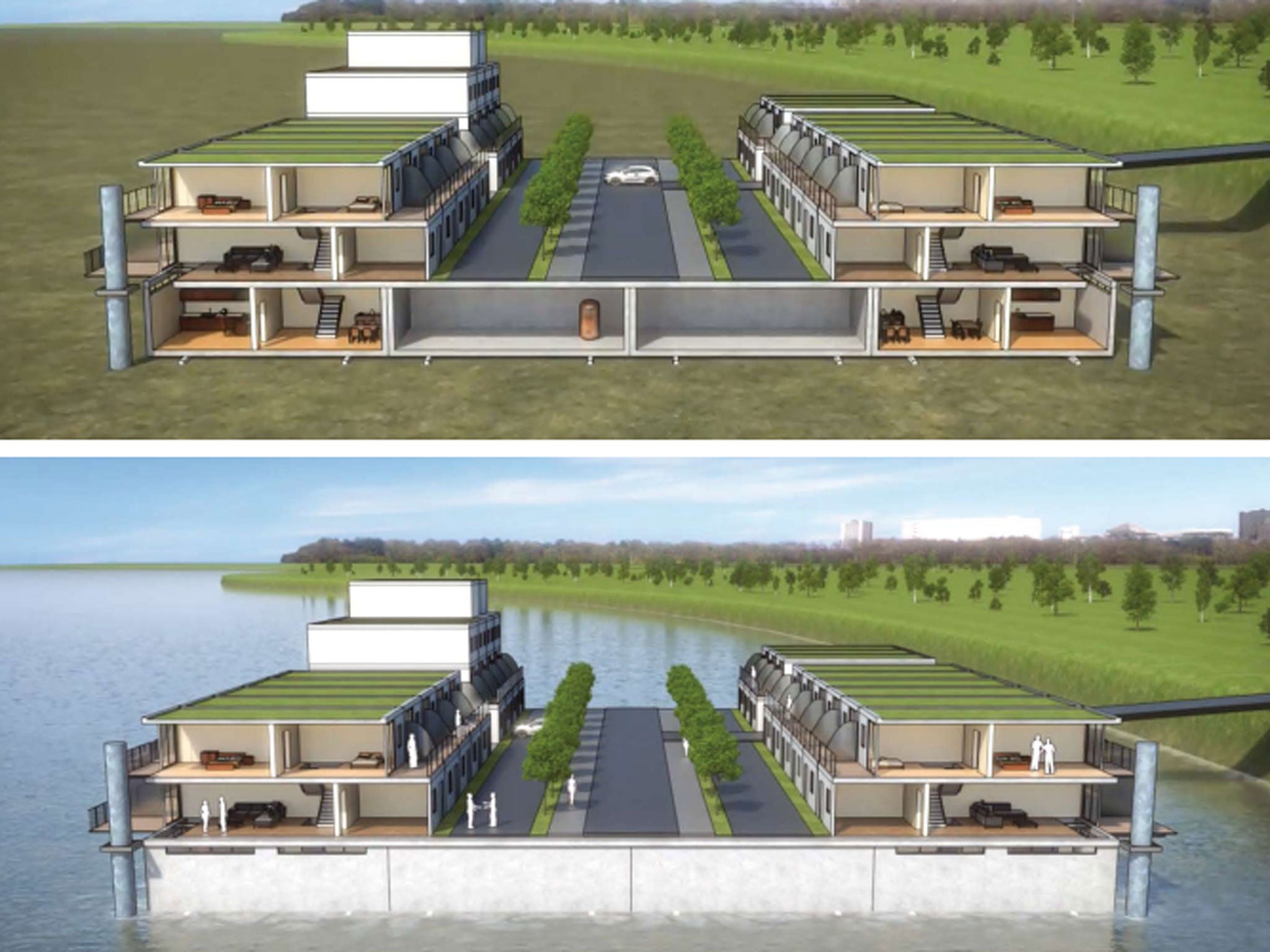A rising tide lifts all the houses: Floating homes being seriously considered at sites across the UK
As the Big Thaw brings more flooding, Tom Peck investigates if floating homes can meet housing need in age of increased rainfall.

If we can’t hold back the tide, why not rise with the river level?
They may sound like something out of Kevin Costner’s widely-panned Waterworld film, but floating homes are being seriously considered at sites across the UK as a solution to the country’s housing crisis.
With flooding set to become more common as climate change worsens, floating developments – which are already common in low-lying regions of the Netherlands and Indonesia – offer the prospect of secure, eco-friendly housing on marginal wetland sites.
There are several different technologies, but the one attracting the most attention is a potential development of 64 homes in Surbiton, south east London.
The houses, which will be built alongside a restaurant and marina, will sit on metal stilts and a buoyant pontoon above a river. In essence, the driveway and the front door are on the first floor. Large habitable basements are to a varying extent, underwater. If the water level rises, the entire house rises with it. When the water dissipates, it sinks back down again.
“In the last five years, flooding has become a major problem,” said Philip Wallis, the Managing Director of Hydro Properties, the company behind the proposed development. “We think this scheme can be the ultimate demonstration site. To show how man and nature can be developed together in a highly sustainable way.”
That the scheme will indeed allow man and nature to live harmoniously together is a notion on which there is a far from universal agreement. Like similar projects, notably one near Norwich, that would see 670 homes built at the confluence of two rivers, the Surbiton sanctuary has met ferocious local opposition. The Surbiton Filter Beds, where the homes are planned, is a recognised hibernation and feeding area for the rare Daubenton’s bat, and there is concern that the development may affect them. There are also fears over the area’s historical sites. Waterworks at the filter beds allowed Dr John Snow to prove cholera was water-born and helped end outbreaks of the disease throughout the world, around 200 years ago. But the site has lain all but derelict for more than a decade.
There is also disagreement over the extent to which the development might block view of nearby Hampton Court Palace for residents in the area. Objections to development are hardly unusual, but this scheme has drawn criticism on ecological grounds from the local MP, the Energy and Climate Change Minister Ed Davey, and the ecologist Zac Goldsmith, MP for neighbouring Richmond. “Surbiton’s filter beds are simply too special to sacrifice to flats, car parking, a marina and restaurant. It is a “blue lung” for our riverside, with precious birds and bats and a unique and world important history.” Mr Davey said recently.
For now, local opposition has won out. Last week, Kingston council’s planning committee unanimously rejected the plans, after receiving 915 letters of objection and 315 letters of support. Mr Wallis is considering an appeal.
But even if the Surbiton plan never gets off the drawing board, amphibian housing is on the way.
In April, construction will begin on Britain’s first flood-proof floating house, on an island on the River Thames in Marlow.
Other schemes would involve deliberately flooding low lying area at Littlehampton in West Sussex to create lagoon style development.
Met Office scientists predict Britain will only get wetter in the years to come, and the Government estimates the cost of flooding in England alone is already more than £2bn. According to the Environment Agency estimates as many as 2.8m homes in Britain are at risk of flooding.
Subscribe to Independent Premium to bookmark this article
Want to bookmark your favourite articles and stories to read or reference later? Start your Independent Premium subscription today.

Join our commenting forum
Join thought-provoking conversations, follow other Independent readers and see their replies